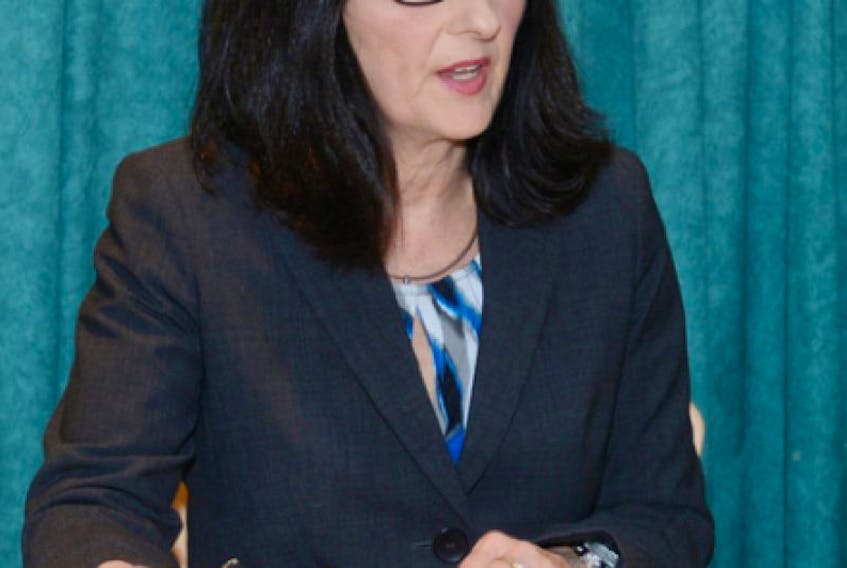The P.E.I. government’s controversial e-gaming venture was riddled with inappropriate secrecy and an overall disregard for taxpayers’ interests, says the province’s auditor general.
Jane MacAdam’s special audit into the province’s e-gaming scandal was released Wednesday.
It is a scathing indictment of the venture pursued by the former Ghiz administration, which aimed to make Prince Edward Island an Internet gambling regulator for the country.
“Throughout this report, there are numerous examples of non-compliance with legislation, policies and controls,” MacAdam says in her report.
“A number of decisions and actions demonstrated a lack of due regard for transparency and accountability.”
WHAT SOME ISLANDERS HAVE TO SAY
MacAdam’s report delves into the e-gaming initiative as well as work done on a proposed tourism loyalty program and a financial services platform.
The three initiatives were linked mainly by the players and government officials involved, the time frames in question and the ways in which government officials skirted rules and policies to keep their activities secret.
Among her overall conclusions, the auditor general found:
- Due diligence was not applied by various senior officials and staff in approving, disbursing and reporting on loans and grants provided to the Mi’kmaq Confederacy of P.E.I. to fund work on e-gaming.
- There were apparent conflicts of interest with two senior executives involved in these files: former chief of staff Chris LeClair and former deputy minister Melissa MacEachern
- Another former deputy minister, Tracey Cutcliffe, secured various contracts through a consulting company within weeks of leaving her position with government.
- Emails of a number of key players in e-gaming were deleted after they left government, which means some government records are not being managed and saved properly.
The report includes 15 recommendations to government for changes, but MacAdam says the most of the major concerns involved in the e-gaming file were not caused by a lack of laws or controls, but rather that existing controls were simply not followed.
E-gaming was a government-led initiative, but involved a number of non-government partners. Without a contract or formal agreement with all of those involved, government opened itself up to all the problems that ended up plaguing this file, MacAdam said.
“To me that is the root cause of the scope limitation in the report. Access to information became a problem.”
Premier Wade MacLauchlan says his government will “act swiftly” on all 15 recommendations, committing to better rules around government record keeping and new whistleblower protection legislation.
E-gaming in a nutshell
The P.E.I. government began working on e-gaming with the Mi’kmaq Confederacy of P.E.I. (MCPEI) in July 2009.
The plan was to make P.E.I. an Internet gambling regulator for Canada, a plan estimated to be worth more than $20 million a year in new tax and licensing revenues for the P.E.I. government.
The preferred approach was to get agreements from other provinces to regulate gaming activities in those provinces. Plan B was to have the P.E.I. First Nations attempt to assert a constitutional right to conduct gaming.
The initiative was funded by the province through grant and loan funding to MCPEI. At least $1.5 million was spent on the initiative.
A confidential working group was formed in February 2010 to develop the e-gaming proposal. It included former finance minister Wes Sheridan, McInnes Cooper lawyers Gary Scales, Kevin Kiley and Mike O’Brien as well as Don MacKenzie of the Mi’kmaq Confederacy.
After more than three years of work, the provinces would not sign onto the preferred plan and an aboriginal law expert determined the Plan B approach would violate the Criminal Code of Canada.
Government walked away from e-gaming in February 2012. But work on the initiative continued by McInnes Cooper and MCPEI until January 2013.
Taxpayers’ money
Work on e-gaming was funded by the province through one loan and three grants to MCPEI.
The auditor general estimates at least $1.5 million was spent on the e-gaming initiative. She says more money might also have been spent, but since not all work done on the file was charged as a direct expense marked “e-gaming”, it is not possible to definitively determine the total
MacAdam identifies a number of concerns with the $950,000 loan to MCPEI, including the fact Sheridan guaranteed the loan without cabinet approval.
She also reveals that three additional grants totaling close to $500,000 were also issued to MCPEI for e-gaming. These grants were previously not publicly reported.
The majority of the money went to McInnes Cooper for “professional fees.”
MacAdam told reporters Wednesday that McInnes Cooper had contracts with outside parties for some of this work, but since it would not comply with her audit, she had no further details.
She further raises concerns about $390,000 of the money government gave to MCPEI for e-gaming, as it paid for work completed after government had walked away from the proposal.
The terms of this payout were also “problematic,” the AG says. Some of it came from the $950,000 loan, some came from a $100,000 grant to MCPEI and the rest came from the Atlantic Lottery Corporation, which agreed to purchase a “legal analysis relating to Internet gaming” for $60,000 from MCPEI, and the money would be forward to McInnes Cooper.
Access to information concerns
As part of her audit, MacAdam reviewed more than 10,000 documents, not including thousands of additional documents from several parties involved.
She estimates she spent 5,000 hours on her investigation and her office spent $30,000 on outside specialists for help on this file.
Despite this, there are holes in her investigation.
She notes a private law firm that was part of the e-gaming working group and a key player in the initiative refused to co-operate with her audit.
That law firm was McInnes Cooper.
MacAdam says she considered using her power of subpoena under the Public Inquiries Act to compel documents and witnesses from McInnes Cooper, but in the end decided it was would be too costly to taxpayers and would further delay the release of her report.
She was also unable to obtain emails from some of the key government officials because they had been deleted after they left government.
She also asked for text messages and Blackberry PINs, but was not provided with anything, even though she had evidence that such records existed.
“We were advised there were instances where interface issues were encountered with the archives of government’s e-mail system which led to electronic data being lost. Therefore, we could not determine if the information we received included all relevant government records,” MacAdam said.
Staffers raised concerns
MacAdam discovered that legislative counsel staff raised several concerns in March 2011 about the e-gaming initiative to senior officials in the Department of Justice.
These concerns included confusion over who was “in charge of the file” and about the way the $950,000 loan to MCPEI was handled.
MacAdam notes the province’s current whistleblower policy does not go far enough to protect government employees who may want to blow the whistle on initiatives like this one.
She called on government to adopt whistleblower protection legislation, as most other provinces have already done.
The P.E.I. government’s controversial e-gaming venture was riddled with inappropriate secrecy and an overall disregard for taxpayers’ interests, says the province’s auditor general.
Jane MacAdam’s special audit into the province’s e-gaming scandal was released Wednesday.
It is a scathing indictment of the venture pursued by the former Ghiz administration, which aimed to make Prince Edward Island an Internet gambling regulator for the country.
“Throughout this report, there are numerous examples of non-compliance with legislation, policies and controls,” MacAdam says in her report.
“A number of decisions and actions demonstrated a lack of due regard for transparency and accountability.”
WHAT SOME ISLANDERS HAVE TO SAY
MacAdam’s report delves into the e-gaming initiative as well as work done on a proposed tourism loyalty program and a financial services platform.
The three initiatives were linked mainly by the players and government officials involved, the time frames in question and the ways in which government officials skirted rules and policies to keep their activities secret.
Among her overall conclusions, the auditor general found:
- Due diligence was not applied by various senior officials and staff in approving, disbursing and reporting on loans and grants provided to the Mi’kmaq Confederacy of P.E.I. to fund work on e-gaming.
- There were apparent conflicts of interest with two senior executives involved in these files: former chief of staff Chris LeClair and former deputy minister Melissa MacEachern
- Another former deputy minister, Tracey Cutcliffe, secured various contracts through a consulting company within weeks of leaving her position with government.
- Emails of a number of key players in e-gaming were deleted after they left government, which means some government records are not being managed and saved properly.
The report includes 15 recommendations to government for changes, but MacAdam says the most of the major concerns involved in the e-gaming file were not caused by a lack of laws or controls, but rather that existing controls were simply not followed.
E-gaming was a government-led initiative, but involved a number of non-government partners. Without a contract or formal agreement with all of those involved, government opened itself up to all the problems that ended up plaguing this file, MacAdam said.
“To me that is the root cause of the scope limitation in the report. Access to information became a problem.”
Premier Wade MacLauchlan says his government will “act swiftly” on all 15 recommendations, committing to better rules around government record keeping and new whistleblower protection legislation.
E-gaming in a nutshell
The P.E.I. government began working on e-gaming with the Mi’kmaq Confederacy of P.E.I. (MCPEI) in July 2009.
The plan was to make P.E.I. an Internet gambling regulator for Canada, a plan estimated to be worth more than $20 million a year in new tax and licensing revenues for the P.E.I. government.
The preferred approach was to get agreements from other provinces to regulate gaming activities in those provinces. Plan B was to have the P.E.I. First Nations attempt to assert a constitutional right to conduct gaming.
The initiative was funded by the province through grant and loan funding to MCPEI. At least $1.5 million was spent on the initiative.
A confidential working group was formed in February 2010 to develop the e-gaming proposal. It included former finance minister Wes Sheridan, McInnes Cooper lawyers Gary Scales, Kevin Kiley and Mike O’Brien as well as Don MacKenzie of the Mi’kmaq Confederacy.
After more than three years of work, the provinces would not sign onto the preferred plan and an aboriginal law expert determined the Plan B approach would violate the Criminal Code of Canada.
Government walked away from e-gaming in February 2012. But work on the initiative continued by McInnes Cooper and MCPEI until January 2013.
Taxpayers’ money
Work on e-gaming was funded by the province through one loan and three grants to MCPEI.
The auditor general estimates at least $1.5 million was spent on the e-gaming initiative. She says more money might also have been spent, but since not all work done on the file was charged as a direct expense marked “e-gaming”, it is not possible to definitively determine the total
MacAdam identifies a number of concerns with the $950,000 loan to MCPEI, including the fact Sheridan guaranteed the loan without cabinet approval.
She also reveals that three additional grants totaling close to $500,000 were also issued to MCPEI for e-gaming. These grants were previously not publicly reported.
The majority of the money went to McInnes Cooper for “professional fees.”
MacAdam told reporters Wednesday that McInnes Cooper had contracts with outside parties for some of this work, but since it would not comply with her audit, she had no further details.
She further raises concerns about $390,000 of the money government gave to MCPEI for e-gaming, as it paid for work completed after government had walked away from the proposal.
The terms of this payout were also “problematic,” the AG says. Some of it came from the $950,000 loan, some came from a $100,000 grant to MCPEI and the rest came from the Atlantic Lottery Corporation, which agreed to purchase a “legal analysis relating to Internet gaming” for $60,000 from MCPEI, and the money would be forward to McInnes Cooper.
Access to information concerns
As part of her audit, MacAdam reviewed more than 10,000 documents, not including thousands of additional documents from several parties involved.
She estimates she spent 5,000 hours on her investigation and her office spent $30,000 on outside specialists for help on this file.
Despite this, there are holes in her investigation.
She notes a private law firm that was part of the e-gaming working group and a key player in the initiative refused to co-operate with her audit.
That law firm was McInnes Cooper.
MacAdam says she considered using her power of subpoena under the Public Inquiries Act to compel documents and witnesses from McInnes Cooper, but in the end decided it was would be too costly to taxpayers and would further delay the release of her report.
She was also unable to obtain emails from some of the key government officials because they had been deleted after they left government.
She also asked for text messages and Blackberry PINs, but was not provided with anything, even though she had evidence that such records existed.
“We were advised there were instances where interface issues were encountered with the archives of government’s e-mail system which led to electronic data being lost. Therefore, we could not determine if the information we received included all relevant government records,” MacAdam said.
Staffers raised concerns
MacAdam discovered that legislative counsel staff raised several concerns in March 2011 about the e-gaming initiative to senior officials in the Department of Justice.
These concerns included confusion over who was “in charge of the file” and about the way the $950,000 loan to MCPEI was handled.
MacAdam notes the province’s current whistleblower policy does not go far enough to protect government employees who may want to blow the whistle on initiatives like this one.
She called on government to adopt whistleblower protection legislation, as most other provinces have already done.









